When you finish teaching your lesson or preaching your sermon, how do you know if you accomplished anything? You won’t unless you have set goals for yourself.
No matter what learning style you are trying to reach, you cannot just present facts. Instead, you need to know what your plans (goals) are. In Part 8 of this series, a lesson plan format was presented (available on line). On page one it asks you to think through two things: what is your AIM and what are your Objectives.
An aim is written in broad terms stating what the pupil should learn. It does not state what the learner will do to prove he has learned; it states in relatively broad terms the direction of learning. Aims do not state what the teacher will do to teach the lesson. They tell what happens or will happen to the learner by the end of the lesson.
Objectives are what the student does to “prove” the lesson aim has been achieved. How many times have you finished teaching a lesson and walked away not having a clue if what you just did accomplished anything? You feel like you have “taught” a great lesson, but do you really know if the student has walked away not only having heard a great lesson, but has something he can do with it? Instead, you can look back at your lesson plan and know for sure if you accomplished anything by reviewing your goal (aim-objectives).
Writing aims and objectives are not complicated, but they are necessary if you want to accomplish anything more than you talking for an hour. Here are a few examples. The aim is in bold (left), and the objective is in italics (right):
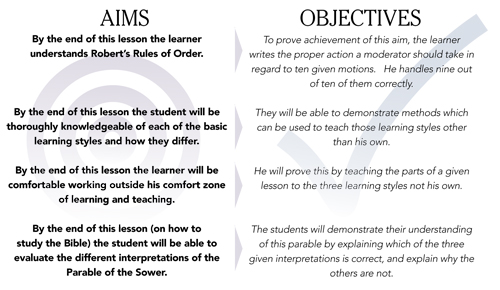
The writing of aims and objectives need not be seen as a daunting task. It is, however, the only way you can know if you have accomplished your goal for that lesson. To help you with this I will make available a complete study on the writing of aims and objectives. Just write me and request it at dbennett@pcanet.org.
Next time we go over how to write objectives for each of the three domains of objectives – what you want them to know, to be, and to do. e
– Dennis Bennett, Coordinator of Resources

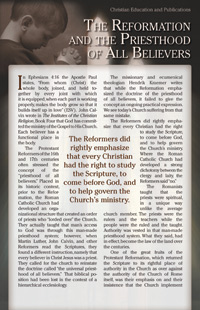
 In our Christian education and Publications training events, we use the phrase “the whole Gospel for the whole church.” We have been asked what we mean by that, to which we have responded: Kingdom discipleship focuses on the whole truth of scripture, and its audience is the entire church at all age levels.
In our Christian education and Publications training events, we use the phrase “the whole Gospel for the whole church.” We have been asked what we mean by that, to which we have responded: Kingdom discipleship focuses on the whole truth of scripture, and its audience is the entire church at all age levels.
 A kingdom disciple is not only one who knows King Jesus, but one who loves, serves, and thinks like King Jesus. How do we begin to take our children from the classical grammar stage of their faith into the logical and rhetorical living out of what they believe? A standard component of our ministry to children must be parental training. It is the serving, giving, loving, obedient parent who will most likely produce a serving, giving, loving, obedient child. Again, this is a heart issue, but no person can see a parent’s heart better than their own child. They are blessings in this way – always reminding us of our need of saving grace. As we know and see the needs of each individual child, the church’s ministry is to ask what we can do to aid the parent in bringing the child to Christ. This is the gospel message – Jesus came down to earth, becoming man, and we must meet every child and family where they are, while knowing that our God is faithful. He is most glorified when the most difficult circumstances are overcome each day by the work of his grace. True kingdom ministry is never trying to get around a special need, but looking for the power of God to work mightily in it.
A kingdom disciple is not only one who knows King Jesus, but one who loves, serves, and thinks like King Jesus. How do we begin to take our children from the classical grammar stage of their faith into the logical and rhetorical living out of what they believe? A standard component of our ministry to children must be parental training. It is the serving, giving, loving, obedient parent who will most likely produce a serving, giving, loving, obedient child. Again, this is a heart issue, but no person can see a parent’s heart better than their own child. They are blessings in this way – always reminding us of our need of saving grace. As we know and see the needs of each individual child, the church’s ministry is to ask what we can do to aid the parent in bringing the child to Christ. This is the gospel message – Jesus came down to earth, becoming man, and we must meet every child and family where they are, while knowing that our God is faithful. He is most glorified when the most difficult circumstances are overcome each day by the work of his grace. True kingdom ministry is never trying to get around a special need, but looking for the power of God to work mightily in it. Most churches will at some point wrestle with the question of purpose for their ministry to the next generation. The answer to this foundational question becomes the destination point that the entirety of the youth program is moving toward. In the same way that a GPs needs the destination point in order to tell you how to get there, a youth ministry needs a desired outcome to be able to chart the best course of action. Without a well-thought out, biblically-informed, easily-understood purpose, your youth ministry will waste valuable time on programs that do little more than entertain the rising generation. For this reason, every church should not only do the work necessary to answer the question of purpose in ministry to youth, but it should regularly use that purpose as the lens with which the youth program is evaluated.
Most churches will at some point wrestle with the question of purpose for their ministry to the next generation. The answer to this foundational question becomes the destination point that the entirety of the youth program is moving toward. In the same way that a GPs needs the destination point in order to tell you how to get there, a youth ministry needs a desired outcome to be able to chart the best course of action. Without a well-thought out, biblically-informed, easily-understood purpose, your youth ministry will waste valuable time on programs that do little more than entertain the rising generation. For this reason, every church should not only do the work necessary to answer the question of purpose in ministry to youth, but it should regularly use that purpose as the lens with which the youth program is evaluated.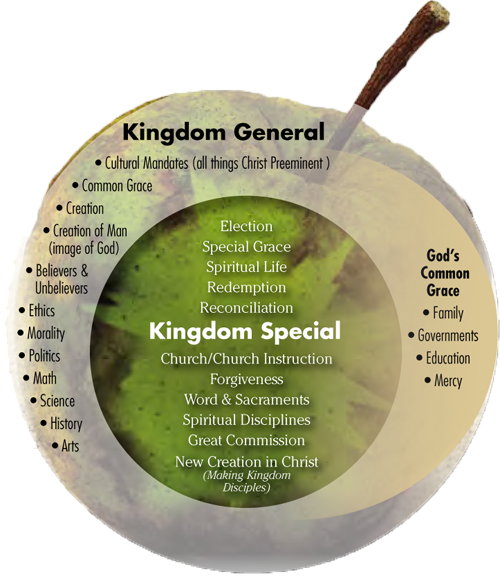
 Because of all that invades our lives on a daily basis, we just don’t seem to have the time to set aside for teaching our children. But there may be a way we can do something, at least to start. How about making a family decision to set apart one night a week, preferably the same night each week? This day must become sacred and special to all and only the most critical interruption will be allowed to break this pledge.
Because of all that invades our lives on a daily basis, we just don’t seem to have the time to set aside for teaching our children. But there may be a way we can do something, at least to start. How about making a family decision to set apart one night a week, preferably the same night each week? This day must become sacred and special to all and only the most critical interruption will be allowed to break this pledge.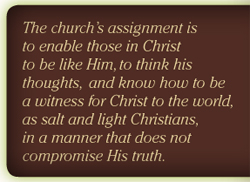 Kingdom discipleship focuses on the transformation of the mind, not simply in an abstract way, but in a manner that enables Christians to know what God would have them to do in life, as they move outside the special kingdom (the church) into the kingdom general to live with a Christian perspective (see illustration on page 8). The key is to have a kingdom focus that understands and knows what it means to acknowledge King Jesus as Lord of all. Of course, you do not have to be a Christian to live in the kingdom general because it encompasses all of life and reality, but to be a Christian living in the kingdom, you must have a Christian perspective and commitment as you live each day. No matter whether you are a school teacher, a technician, a historian, a scientist, an artist, a politician, etc., God requires that we bring His will and the mind of Christ into all those areas of life. If the church is following His instructions regarding the discipleship of all Christians, young and old, we will be better equipped to live in this world in a way that brings honor and glory to our God and does so in a way that demonstrates a Christian influence in all things. Paul said, “Whether we eat or drink or whatever we do, we are to do all to the glory of God” (I Corinthians 10:31).
Kingdom discipleship focuses on the transformation of the mind, not simply in an abstract way, but in a manner that enables Christians to know what God would have them to do in life, as they move outside the special kingdom (the church) into the kingdom general to live with a Christian perspective (see illustration on page 8). The key is to have a kingdom focus that understands and knows what it means to acknowledge King Jesus as Lord of all. Of course, you do not have to be a Christian to live in the kingdom general because it encompasses all of life and reality, but to be a Christian living in the kingdom, you must have a Christian perspective and commitment as you live each day. No matter whether you are a school teacher, a technician, a historian, a scientist, an artist, a politician, etc., God requires that we bring His will and the mind of Christ into all those areas of life. If the church is following His instructions regarding the discipleship of all Christians, young and old, we will be better equipped to live in this world in a way that brings honor and glory to our God and does so in a way that demonstrates a Christian influence in all things. Paul said, “Whether we eat or drink or whatever we do, we are to do all to the glory of God” (I Corinthians 10:31). Second, the identification model opens the door to be both in the world and of the world which usually translates that the world has more influence on us than we have on the world. Again, we can and should use much in our culture as a means of serving God and bearing witness to Christ, but not to the point of comprising any part of God’s truth. We live in a fallen world and our culture is not free from the kingdom of darkness influence. Actually, we live in daily spiritual warfare. A further point to remember about this second model is that the more we are like something, especially what we are speaking against, the less influence we will have in that circumstance to make a difference.
Second, the identification model opens the door to be both in the world and of the world which usually translates that the world has more influence on us than we have on the world. Again, we can and should use much in our culture as a means of serving God and bearing witness to Christ, but not to the point of comprising any part of God’s truth. We live in a fallen world and our culture is not free from the kingdom of darkness influence. Actually, we live in daily spiritual warfare. A further point to remember about this second model is that the more we are like something, especially what we are speaking against, the less influence we will have in that circumstance to make a difference. Developing this world and life kingdom focus means that sermons and Bible studies must be presented in such a way that helps the people to be able to make that kind of world and life view connection. We must know that people in the pew and in our classes struggle to make that connection. They often need help in doing that. So, rather than saying or being tempted to think, “The only way I can survive in this life is to compromise the Christian faith in the marketplace,” we stand strongly and firmly in the Lord and say, “Because of Christ, I cannot compromise His truth even if I am the only one not participating.” That’s where the church’s role to equip Christians to think like a Christian and to live like one, no compromise, but rather to live in a way where all for Jesus comes into play.
Developing this world and life kingdom focus means that sermons and Bible studies must be presented in such a way that helps the people to be able to make that kind of world and life view connection. We must know that people in the pew and in our classes struggle to make that connection. They often need help in doing that. So, rather than saying or being tempted to think, “The only way I can survive in this life is to compromise the Christian faith in the marketplace,” we stand strongly and firmly in the Lord and say, “Because of Christ, I cannot compromise His truth even if I am the only one not participating.” That’s where the church’s role to equip Christians to think like a Christian and to live like one, no compromise, but rather to live in a way where all for Jesus comes into play.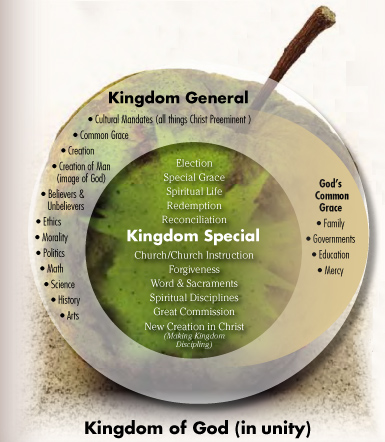
 Years ago it was established there are six basic levels by which actions verbs are measured:
Years ago it was established there are six basic levels by which actions verbs are measured: